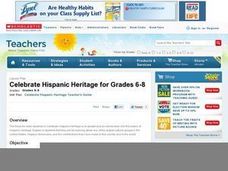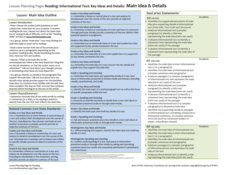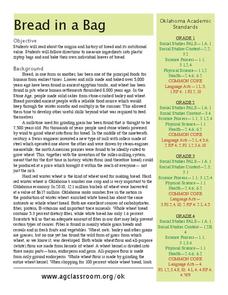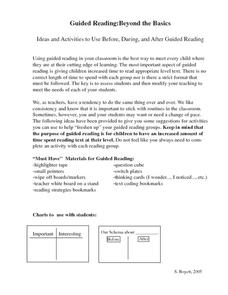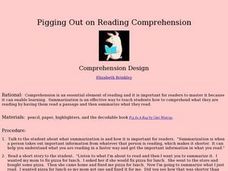Polk Bros Foundation
Comprehensive Nonfiction Reading Questions
Analyze any nonfiction text with the set of questions on this sheet. Class members practice inferring by noting the main idea and purpose of a passage. They also analyze an opinion in the passage and write a brief summary. See the...
Ontario
Reading Informational Text
Learning to recognize the importance of the features of information text (i.e., titles, subtitles, endnotes, sidebars, etc.) is the focus of a reading activity designed for middle schoolers. Learners examine how these text features help...
Curated OER
Lesson Plan for Scaffolding Complex Texts
Enhance a class read-aloud of the children's story Hi! Fly Guy with this reading comprehension lesson. Children first listen as the teacher reads the story, stopping along the way to discuss any unfamiliar vocabulary. The book is then...
Florida Center for Reading Research
Comprehension: Monitoring for Understanding, Simple Summary
Can your class sum up a text in a few sentences? Help them build this skill by starting nice and slow. For this summarizing activity, the teacher marks the main ideas with sticky notes. Learners read and reread the text, pausing at the...
Student Achievement Partners
"The Glorious Whitewasher" from The Adventures of Tom Sawyer by Mark Twain with Mini-Assessment
It's the classic scene: Tom Sawyer is whitewashing a fence. Expose your learners to Mark Twain's humor while reinforcing reading comprehension. Eighth graders are encouraged to read and reread, achieving as much exposure to the text as...
Curated OER
Let's Get it Together! Reading to Learn
Let’s learn about frogs! Young readers are led through “Freaky Frogs,” a non-fiction article. Teach learners how to edit an article so there are fewer details to sift through. After talking through the article, they learn the six steps...
Curated OER
Introduce: Summarizing Narrative Text
When scholars re-tell a story, do they boil it down to important details in a logical order? Practice summarizing narratives using this think-aloud strategy, which is scripted here for your convenience. After explaining why this is an...
Polk Bros Foundation
I Can Comprehend a Paragraph, then a Page/Section in a Text
Help your class tackle chunks of text with a simple graphic organizer. Pupils read three paragraphs and, as they read, draw pictures in the provided boxes that demonstrate what each paragraph says. There are three boxes on the page and...
Orange County Schools
Piggybook
Summarizing text is a balancing act between being brief but thorough. You need to be short and to the point, but also cover all the important details, a task that presents a challenge for many young learners. In this lesson based on the...
DePaul University
Working at the Television Station
There's a lot that goes on behind the scenes of a local news program. Read this passage independently or as a whole class to learn about all the different people that work hard to bring us the news. Afterward, young learners determine...
Curated OER
Celebrate Hispanic Heritage: Grades 6-8
To gain a better understanding of Hispanic heritage and culture, as well as to build informational comprehension skill, learners explore facets of Hispanic American History. They engage in a class discussion, research three facts, and...
Curated OER
Mapping Out the Story
Discuss the reading comprehension strategy of summarization with your elementary schoolers! They read a chapter from their social studies textbook, Regions Near and Far, and create a map, or word web, for the chapter. They identify...
For the Teachers
Main Idea Outline
Find the main idea in an informational text with a versatile lesson. Three levels of differentiation help you implement the strategy in any age or class level, based on the ability and objectives of your learners.
Education City
Reading Comprehension
Celebrate National Reading Month in March—or any month of the year—with a selection of versatile graphic organizers. The worksheets prompt readers to compare characters easily, predict what will happen next in a story, track their...
Curated OER
Anticipation Guides Improve Reading Comprehension
Beginning with anticipation guide strategies is a powerful method for improving reading comprehension. First, list initial ideas for a topic the class will be reading about. These ideas are formulated into statements, some of which are...
Mary Pope Osborne, Classroom Adventures Program
The Backpack Travel Journals
Strap on those backpacks, it's time to travel through history with this literature unit based on the first four books of The Magic Tree House series. While reading through these fun stories, children create story maps, record interesting...
Curated OER
Only the Facts
Practice the strategy of summarizing to gain meaning and knowledge from an informational text. Young readers highlight supporting details and main ideas, and then they use this to summarize two articles: "The Great Quake" and "What is an...
Curated OER
Ready-Set-Go-Whoa!
The Apaches: People of the Southwest offers readers a chance to employ the “Ready-Set-Go-Whoa!” strategy (an adaptation of the KWL) to test what they know and summarize what they learn as they read Jennifer Fleischner’s nonfiction...
Curated OER
Bread in a Bag
Could the history of bread really be interesting? Yes, it could! An informational text gives scholars wheat production background from 8,000 years ago, discussing different types of bread and the current industry in Oklahoma. Learners...
Scholastic
Summarizing: Using Hand Motions for Key Words or Points
Learning to summarize texts takes practice. Jump into the training ring and guide your learners through a summarizing practice session. The classic direct instructional practice of "I do, you do, we do" is used to help them identify key...
Ideas From Suzi
Guided Reading: Beyond the Basics
Elevate children's reading comprehension skills with this collection of guided reading resources. From paper dice with basic comprehension questions printed on them to a system for using sticky notes to identify key parts of a story,...
Joel Michel Studies
The Tale of Despereaux: Novel Study
What kind of mouse is Despereaux Tilling ... a field mouse? A white-footed mouse? With the novel study for The Tale of Despereaux by Kate DiCamillo, scholars research the different species of mice and draw pictures of the one that they...
Curated OER
Pigging Out on Reading Comprehension
Young scholars summarize a piece of fiction text. After reviewing the correct way to read in order to summarize, students independently read the story "Pig in a Bag." They write a summary paragraph using the process outlined by the...
K12 Reader
Biography of Abraham Lincoln
One skill essential to reading comprehension, is learning how to summarize a text. After reading a biography of Abraham Lincoln, readers demonstrate this ability by crafting a brief summary of Lincoln's life.












